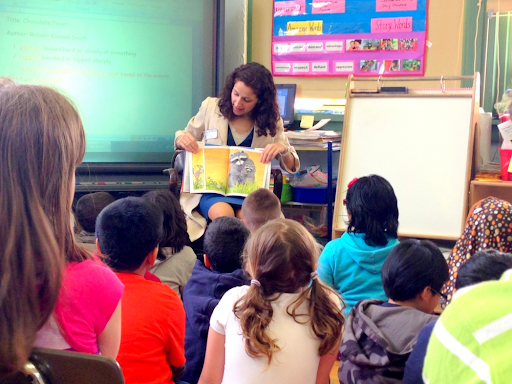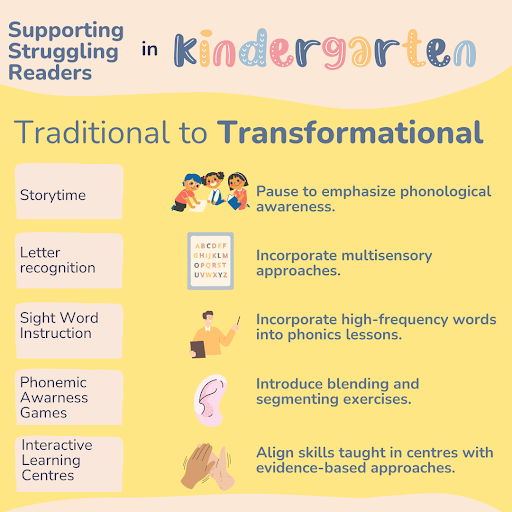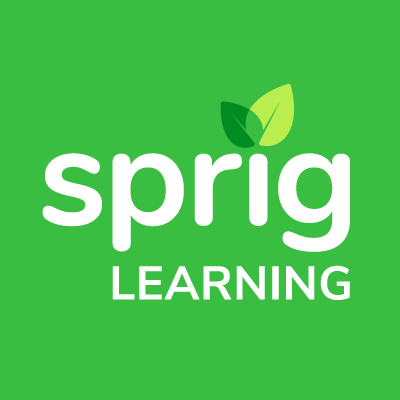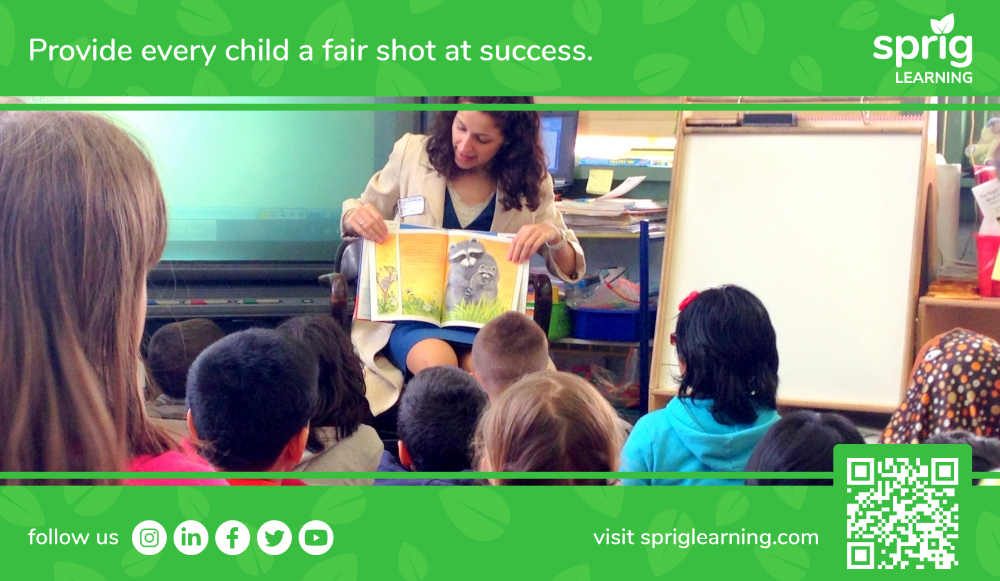Kindergarten marks a critical juncture in a child’s academic journey, where the foundation for literacy skills is established. But often, it’s a phase that is marked with many challenges.
Recognizing these challenges is crucial, given the various factors influencing the struggles some kindergarteners experience in developing early literacy skills.
From diverse developmental timelines to limited exposure to print and vocabulary gaps, each challenge demands attention. This is especially true at a time when there are curriculum/standard mandates for kindergarten being introduced at various jurisdictions.
Educators in kindergarten need help to transform their teaching practices.
In this blog, we delve into the specific challenges kindergarteners may encounter, shedding light on how evidence-based practices can transform traditional teaching methods to provide enhanced literacy support for struggling readers.
Understanding the Challenges: Why Kindergarteners Struggle with Reading

Kindergarten is a crucial phase in a child’s academic journey, and while many thrive, many also encounter challenges on the path to reading proficiency.
Several factors contribute to the struggles kindergarteners may face in developing early literacy skills.
Diverse Access and Opportunity for Learning:
Kindergarteners enter school with varying levels of pre-literacy skills.
Factors such as access and exposure to books, language-rich environments, and individual cognitive development can influence a child’s readiness for reading.
Phonological Awareness Development:
The acquisition of phonological awareness, the ability to recognize and manipulate sounds in spoken language, is a cornerstone of early literacy.
Some kindergarteners may struggle with distinguishing individual sounds, which can impede their ability to decode words.
Limited Exposure to Print:
Children who have limited exposure to books, vocabulary-rich conversations, and print materials at home may face challenges when introduced to reading in a formal educational setting.
Lack of prior exposure can impact their understanding of print concepts.
Vocabulary Gaps:
Kindergarteners with limited vocabulary may find it challenging to comprehend and engage with written text.
Vocabulary gaps can hinder their ability to make connections between spoken and written words.
Attention and Focus:
The transition to a structured learning environment in kindergarten introduces new expectations for attention and focus.
Some children may struggle to maintain concentration during literacy activities, affecting their engagement with reading materials.
Social and Emotional Factors:
Social and emotional development plays a crucial role in a child’s ability to learn.
Kindergarteners who face challenges in these areas, such as anxiety or difficulty with peer interactions, may find it challenging to fully engage in literacy tasks.
Variability in Home Literacy Practices:
Disparities in home literacy practices can impact a child’s preparedness for reading.
Kindergarteners exposed to consistent reading experiences at home may exhibit greater confidence and proficiency compared to those with limited exposure.
Help is Available: Transform Existing Practices Into Evidence-based Practices

As kindergarten is such a crucial period for laying the groundwork for a child’s literacy journey, it is very important to put our best foot forward.
While early reading struggles are a reality, addressing early reading challenges becomes simpler with innovative additions.
While existing teaching practices are in place, the incorporation of evidence-based strategies can significantly enhance early literacy support for struggling readers.
In the following passages, let’s explore the transformation of widely used kindergarten teaching practices into evidence-based approaches that bolster literacy skills.
1. Storytime and Read-Aloud Sessions:
Traditional Practice:
Storytime is a common practice, fostering a love for books and language. It aims to instill a love for books and language among young learners.
Transformation:
Elevate storytime by incorporating interactive elements. Pause to discuss story elements, engage in predictive questioning, and emphasize phonological awareness during shared reading.
This transformation ensures that the storytelling experience not only captivates but also fosters essential and foundational early literacy skills.
2. Letter Recognition Activities:
Traditional Practice:
Letter recognition games and activities are commonplace to introduce the alphabet.
Transformation:
Revamp letter recognition by incorporating multisensory approaches. Introduce activities like tracing letters in sand or using textured materials to reinforce letter-sound connections.
This transformation adds a tactile dimension, making the learning process more engaging and reinforcing the foundational link between letters and their sounds.
3. Sight Word Instruction:
Traditional Practice:
Memorization of sight words is a standard practice for building early reading vocabulary.
Transformation:
Approach sight word instruction more like learning high-frequency words (and not those we need to learn by sight) and incorporate into your phonics lessons. Students can use their phoneme knowledge to map the regular part of the words, then only have to learn the sounds that are irregular in the word.
This transformation complements structured literacy approaches and makesinstruction, the learning more meaningful for young readers.
4. Phonemic Awareness Games:
Traditional Practice:
Phonemic awareness games focus on auditory skills through rhyming and sound recognition.
Transformation:
Transform phonemic awareness games by incorporating a broader range of activities. Introduce sound blending and segmenting exercises to enhance foundational skills crucial for early reading.
This transformation expands the scope of auditory skill development, providing a more comprehensive approach to phonemic awareness.
5. Interactive Learning Centres:
Traditional Practice:
Learning centres offer a diverse range of activities to reinforce various skills. These activities, while diverse, may lack a specific and structured approach to literacy development.
Transformation:
Reimagine interactive learning centers by aligning activities with structured literacy approaches. Ensure a focus on phonics, decoding, and comprehension skills within these centers, while supporting play-based and joyful learning activities
This transformation brings a targeted and intentional approach to the learning centers, maximizing their impact on essential early reading skills.
Traditional to Transformational: Supporting Struggling Readers in Kindergarten

By transforming existing kindergarten teaching practices into evidence-based approaches, educators can provide more targeted and impactful support for struggling readers.
These evidence-based strategies create a solid foundation, fostering a love for literacy and ensuring that every child receives the necessary lessons and practice sessions for early reading success.
Transforming existing teaching, assessment, and differentiated learning practices is no small task.
Streamlining this process is made easier with interactive, evidence-based activities aligned with the latest research on early reading success.
Sprig Reading contains all of these strategies and learning activities for each foundational reading skill set, with an assessment methodology to monitor progress weekly. Try it today for free!

